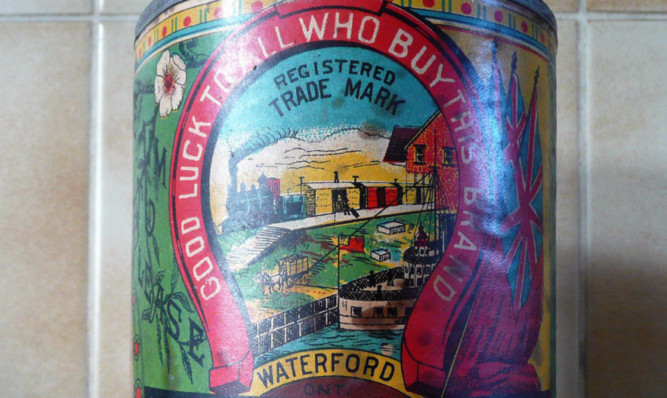Angus can claim a unique recycling record after sending a 120-year-old food tin back home to Canada.
The item has survived intact since it left the Ontario factory of Bowlby Bros filled with “choice winter apples” for a Scots customer to enjoy.
However, following its chance discovery in Kirriemuir, the artefact is now set for a return journey across the Atlantic to become the centrepiece of a display in its town of origin, in the very factory where the fruit was canned.
Kirriemuir Heritage Trust chairman David Orr said museum bosses in Waterford, Ontario, have been delighted to hear of the unusual find.
“It should have been thrown away over 100 years ago, but by a strange quirk of fate it has survived,” Mr Orr said.
“KHT contacted the Waterford heritage agricultural museum in Ontario, whose staff were aware that the Bowlby factory had shipped its products to Scotland.
“But an original can with a label on it is something that has been missing from their collection, so the museum was delighted with the heritage trust’s offer to return the tin home.
“Melissa Collver, the curator of Waterford museum, finds it very exciting and, of course, they prefer to think of it as a Canadian treasure rather than Canadian rubbish.”
Mr Orr said KHT has decided to gift the can to the museum, rather than loaning it, so it can become part of their permanent exhibit featuring the factory.
A small canning operation opened in Waterford, Ontario, in 1881.
Brothers Russell and Arthur Bowlby bought the factory a year later and it became the largest canning plant in Canada, employing 150 men and women and producing up to one million cans of fruit and vegetables during a single packing season.
Canadian Canners bought Bowlby Bros. & Co in 1903. The factory began canning pickles in 1936 and was affectionately known by locals as the pickle factory.
Canadian Canners closed the Waterford factory in 1983. It re-opened as a museum in 1985.
